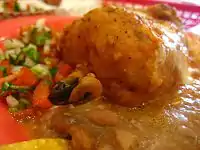Chile relleno
The chile relleno (Spanish pronunciation: [ˈtʃile reˈʎeno], literally "stuffed chile")[1] is a dish in Mexican cuisine that originated in the city of Puebla. In 1858 it was described as a "green chile pepper stuffed with minced meat and coated with eggs".[1]
 Chiles rellenos | |
| Course | Entrée |
|---|---|
| Place of origin | Mexico |
| Serving temperature | Hot |
| Main ingredients | Poblano pepper, egg, cheese |
| Variations | New Mexico chile, pasilla, meat |
The most common pepper used is Puebla’s poblano pepper, though New Mexico chile, pasilla, or even jalapeño peppers are popular as well. It is typically stuffed with melted cheese, such as queso Chihuahua or queso Oaxaca or with picadillo meat made of diced pork, raisins and nuts, seasoned with canella; covered in an egg white batter, simply corn masa flour and fried, or without any batter at all.[2][3] Although it is often served in a tomato sauce, the sauces can vary.
Regional variation
Mexico
Some regional versions in Mexico use rehydrated dry chiles such as anchos or pasillas.[2]
United States
In the United States, chiles rellenos are usually filled with asadero or Monterey Jack cheese, but can also be found with cheddar or other cheeses, as well as ground or minced meat.[4] Typically the chile is then dipped in an egg white batter and either pan-fried or deep-fried. Chiles rellenos are a popular cuisine in the U.S. state of New Mexico, where the Hatch chile is revered for its slender (rather than round) shape and medium-to-hot flavor. In the contiguous U.S., rellenos are typically served with red or green chile sauce or mole.
Variations, which can be seen based on regional tastes or experimentation, include:
- pecan-encrusted
- crab-filled
- inside of a "chile relleno burrito"
- in a casserole form (which can be more practical for serving groups of people)[5]
A recipe from 1914 (as "chili reinas") is published in a period guidebook to San Francisco restaurants.[6]
Guatemala
In Guatemala, the pimiento pepper is stuffed with shredded pork and vegetables. Like the Mexican version, it is covered with egg batter and fried. It is served with tomato sauce or inside a bread bun.
Gallery

 Jalapeño "poppers", another form of chiles rellenos
Jalapeño "poppers", another form of chiles rellenos A Mexican-American variation which has chiles stuffed with monterey jack cheese and an egg batter, baked in a casserole dish
A Mexican-American variation which has chiles stuffed with monterey jack cheese and an egg batter, baked in a casserole dish
References
- Velázquez de la Cadena, Mariano (1858). A dictionary of the Spanish and English languages. New York, New York: D. Appleton & Company. p. 96 – via Google Books.
- Bayless, Rick; Brownson, JeanMarie & Bayless, Deann Groen (2000). Mexico One Plate at a Time. Simon & Schuster. pp. 194–195. ISBN 9780684841861 – via Google Books.
- Kenyon, Chelsie (10 April 2012). "How to Make Chile Rellenos". About.com. Retrieved 7 January 2013.
- Curtis, Susan & Ammerman, Nicole Curtis (2006). Southwest Flavors: Santa Fe School of Cooking. Gibbs Smith. p. 131. ISBN 9781586856977 – via Google Books.
- Cordero-Cordell, Teresa & Cordell, Robert (2007). Aprovecho: A Mexican-American Border Cookbook. Hippocrene Books. p. 159. ISBN 9780781812061 – via Google Books.
- Edwords, Clarence E. (1914). Bohemian San Francisco: Its Restaurants and Their Most Famous Recipes. San Francisco: Paul Elder and Company – via Books about California History and Culture.




.jpg.webp)




_01.JPG.webp)